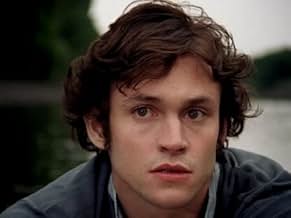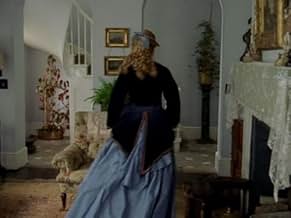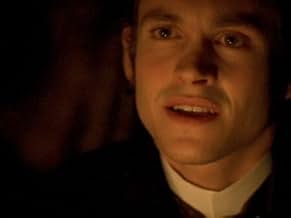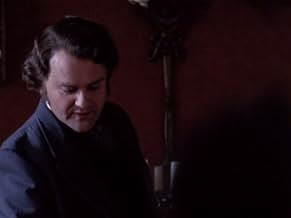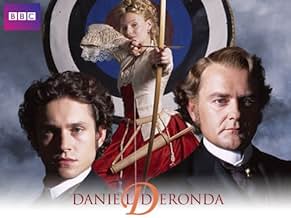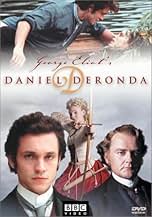Daniel Deronda
- Minissérie de televisão
- 2002
- 53 min
AVALIAÇÃO DA IMDb
7,2/10
5,4 mil
SUA AVALIAÇÃO
Adicionar um enredo no seu idiomaSet in Victorian London, Gwendolen Harleth is drawn to Daniel Deronda, a selfless and intelligent gentleman of unknown parentage, but her own desperate need for financial security may destro... Ler tudoSet in Victorian London, Gwendolen Harleth is drawn to Daniel Deronda, a selfless and intelligent gentleman of unknown parentage, but her own desperate need for financial security may destroy her chance at happiness.Set in Victorian London, Gwendolen Harleth is drawn to Daniel Deronda, a selfless and intelligent gentleman of unknown parentage, but her own desperate need for financial security may destroy her chance at happiness.
- Ganhou 3 prêmios BAFTA
- 5 vitórias e 4 indicações no total
Explorar episódios
Avaliações em destaque
7=G=
"Daniel Deronda" is a worthy knock-off of George Eliot's novel of the same name which tells of a young Englishman's search for meaning and purpose while enjoying a life of property and leisure. As with most Victorian period costume dramas out of the UK, this film is sumptuously appointed and well represented by the players and places as it meanders through the usual multiplicity of relationships from aristocrat to pauper with a Jewish thread for distinction. "Daniel Deronda" conjures a range of characters from a stoic martinet to a spoiled beauty to an attractive Jewess and beyond with love, greed, envy, guile, and death all swirling around the Deronda character as it manages to sort itself out with a coherent story arc and a more or less happy ending. A "should see" for anyone into Victorian flicks. (B)
The title gave me no clue to the absorbing romantic Victorian drama that was to follow. Said to be George Eliot's last great novel, it exposes in no uncertain manner the pitiful life of the Victorian woman, hardly more than an obedient slave and forced to respond to her husband's demands.
Hugh Bonneville stands out among the excellent cast as the nasty Henleigh Grandcourt who revels in watching women squirm under his aristocratic power and Romola Garai is perfect as Gwendolen who marries him, not for love, but to save her family from economic ruin.
Hugh Dancy in the title role of Daniel has immediate appeal with his handsome good looks touched with both shyness and sadness as he ponders over his past life and the unsolved mystery of his mother's identity.
After Daniel saves a woman from drowning in a river, the story takes an unexpected turn and concentrates on the Jewish problem of a permanent homeland. Daniel is much attracted to the woman he has saved and through his efforts to help her some mysteries of his own life are revealed to him.
The sets, costumes and photography capture exquisitely life in England in the Victorian era. Quite apart from the romantic drama, there is much to ponder over in this story. Thankfully to-day women have gained a degree of independence, though not entirely, and the Jews are still uncertain about the boundaries of their homeland.
I can recommend this film which is in 4 parts. Set aside a full evening to watch the story unfold. It's quite long (205 minutes) but a brilliant production.
Hugh Bonneville stands out among the excellent cast as the nasty Henleigh Grandcourt who revels in watching women squirm under his aristocratic power and Romola Garai is perfect as Gwendolen who marries him, not for love, but to save her family from economic ruin.
Hugh Dancy in the title role of Daniel has immediate appeal with his handsome good looks touched with both shyness and sadness as he ponders over his past life and the unsolved mystery of his mother's identity.
After Daniel saves a woman from drowning in a river, the story takes an unexpected turn and concentrates on the Jewish problem of a permanent homeland. Daniel is much attracted to the woman he has saved and through his efforts to help her some mysteries of his own life are revealed to him.
The sets, costumes and photography capture exquisitely life in England in the Victorian era. Quite apart from the romantic drama, there is much to ponder over in this story. Thankfully to-day women have gained a degree of independence, though not entirely, and the Jews are still uncertain about the boundaries of their homeland.
I can recommend this film which is in 4 parts. Set aside a full evening to watch the story unfold. It's quite long (205 minutes) but a brilliant production.
The usual lush mini-series adapation from that reliable team, Andrew Davies and the BBC, of a literary property, this time George Eliot's almost forgotten last novel.
Daniel (Hugh Dancy) is the gorgeous if slightly wet boy of mysterious parentage adopted by wealthy amiable old buffer Sir Hugo (Edward Fox). He falls in love with the wrong woman, the beautiful but self-absorbed Gwendolen (Romola Garai). She however is propelled into marriage with ace bounder (and Sir Hugo's heir) Henleigh Grandcourt (Hugh Bonneville). Daniel then becomes interested in Mirah (Johdi May), a promising singer of Jewish background, and through her ailing brother Mordecai (Daniel Evans) the Zionist cause (yes, hotting up as far back as the 1870s). Grandcourt meets a bounder's fate and Gwendolen is now free to marry Daniel, but guess what ?
The costumes are great, the acting impeccable, the photography luminous but the story lacks punch. It is didactic rather than romantic, with metaphorical posters all over the place for women's rights and a homeland for the Jewish people. Hugh Dancy looks right for the part but Daniel is too much of a prig to be very likeable (though he has my sympathy when he discovers that Barbara Hershey, resplendent in a Venetian Palazzo is his mother Greta Scacchi would not have been so bad).
The most engaging characters are Grandcourt the bounder and his sidekick Lush (David Bamber Mr Collins in `Pride and Prejudice') and yet we are meant to despise them both. Gwendolen is sympathetic to the extent she marries Grandcourt to provide financial security for her mother and sisters, but she is a real dork otherwise. Generally the characters lack the panache of say, Trollope's characters in `The Way We Live Now', or Eliot's own in `Middlemarch'. Perhaps Ms Eliot should have quit while she was ahead.
The critics at the time (including Henry James) were baffled by the `Jewish' aspect of the story. It certainly was an outsider's view, yet it rings true today; here Ms Eliot was being prophetic, or was at least aware of the combination of repression, deprivation and myth that could give rise to a successful social movement. In 1876, the year the novel was published, it seemed most unlikely that Palestine would ever become a significant Jewish settlement. Daniel, desperate to find out about his background, finds a cause bigger than himself and eagerly throws himself into it. One has the feeling that Mirah, musically talented though she is, is going to be playing second fiddle.
Anyway, I enjoyed Hugh Bonneville's Grandcourt, a terrific bounder, and David Bamber's Lush (Mr Collins turns bad). And of course, this is Sunday evening stuff, so one mustn't be too picky about the crummy plot and the unsympathetic principals. I usually find myself at this point thinking `I must read the book' (if I haven't already), but this time I don't think I'll bother.
Daniel (Hugh Dancy) is the gorgeous if slightly wet boy of mysterious parentage adopted by wealthy amiable old buffer Sir Hugo (Edward Fox). He falls in love with the wrong woman, the beautiful but self-absorbed Gwendolen (Romola Garai). She however is propelled into marriage with ace bounder (and Sir Hugo's heir) Henleigh Grandcourt (Hugh Bonneville). Daniel then becomes interested in Mirah (Johdi May), a promising singer of Jewish background, and through her ailing brother Mordecai (Daniel Evans) the Zionist cause (yes, hotting up as far back as the 1870s). Grandcourt meets a bounder's fate and Gwendolen is now free to marry Daniel, but guess what ?
The costumes are great, the acting impeccable, the photography luminous but the story lacks punch. It is didactic rather than romantic, with metaphorical posters all over the place for women's rights and a homeland for the Jewish people. Hugh Dancy looks right for the part but Daniel is too much of a prig to be very likeable (though he has my sympathy when he discovers that Barbara Hershey, resplendent in a Venetian Palazzo is his mother Greta Scacchi would not have been so bad).
The most engaging characters are Grandcourt the bounder and his sidekick Lush (David Bamber Mr Collins in `Pride and Prejudice') and yet we are meant to despise them both. Gwendolen is sympathetic to the extent she marries Grandcourt to provide financial security for her mother and sisters, but she is a real dork otherwise. Generally the characters lack the panache of say, Trollope's characters in `The Way We Live Now', or Eliot's own in `Middlemarch'. Perhaps Ms Eliot should have quit while she was ahead.
The critics at the time (including Henry James) were baffled by the `Jewish' aspect of the story. It certainly was an outsider's view, yet it rings true today; here Ms Eliot was being prophetic, or was at least aware of the combination of repression, deprivation and myth that could give rise to a successful social movement. In 1876, the year the novel was published, it seemed most unlikely that Palestine would ever become a significant Jewish settlement. Daniel, desperate to find out about his background, finds a cause bigger than himself and eagerly throws himself into it. One has the feeling that Mirah, musically talented though she is, is going to be playing second fiddle.
Anyway, I enjoyed Hugh Bonneville's Grandcourt, a terrific bounder, and David Bamber's Lush (Mr Collins turns bad). And of course, this is Sunday evening stuff, so one mustn't be too picky about the crummy plot and the unsympathetic principals. I usually find myself at this point thinking `I must read the book' (if I haven't already), but this time I don't think I'll bother.
10hfk
The first time 'round, when PBS initially offered up "Deronda", I watched the first 15 minutes or so and was so disgusted with Gwendolynn that I changed channels and didn't think twice. Second time 'round, based on reviews here at IMDB, I gave it a bit more time and I'm certainly glad that I did. "Deronda" is a powerfull, beautiful, bit of television. I'm a conservative by nature and, on a regular basis, I'm sickened by the politically correct preaching that's often pushed by PBS and Network television. Daniel Deronda like, say "Prime Suspect", is story-telling with a liberal slant that is both legitimate and thought-provoking. I thoroughly enjoyed the story, and the lush production. I'm surprised by the nit-picking about "wooden" acting: I found the acting excellent, particularly compared to the endless trash television that's pumped into the idiot box these days. perhaps this is trite, but "Deronda" actually inspired me, uplifted me and, at least as far as I'm concerned, that's one of the most significant hallmarks of great art. Don't miss it.
I'm watching the British series Daniel Deronda every week on Swedish tv, and I will recommned it to everyone who fancies quality literary adaptations. The production values are impeccable, and the acting list very impressive. The one to catch your attention, though, is without a doubt Hugh Bonneville as the supervillain Grandcourt. He's everything a good oldfashioned villain from the 19.th century ought to be: suave, cool, arrogant, manipulative, morally corrupt, and with a razor sharp wit. In fact, he totally overshadows the meek and handsome, but oh so noble and earnest hero, poor Daniel Deronda! Hugh Dancy does his best, but it's hard work to make Deronda as interesting as Grandcourt! Likewise with the heroine. Romola Garai is beautiful to look at, but it's difficult to really care about Gwendolyn. She's such a silly, whiny, and cold person who would rather marry a man she dislikes than stoop to be a governess! It made me long to give her a good whipping! All in all, I think she and Deronda deserve each other, for being so awfully colourless and boring. I'd much rather spend the time watching the villain smirk, or wonder about miss Lapidoth's strange fate, among the Jews. As usual, being the villain pays off! Hugh Bonneville and David Bamber as Lush are the characters you remember! They really are perfectly selfish and dastardly mean!
Você sabia?
- CuriosidadesThe novel is set in the early 1860s, whereas the adaptation moves the action ahead to 1874, the year that George Eliot began writing the novel.
- Erros de gravaçãoAt Ezra Cohen's store, the baby's left shoe and sock disappear then reappear.
- ConexõesFeatured in George Eliot: A Scandalous Life (2002)
Principais escolhas
Faça login para avaliar e ver a lista de recomendações personalizadas
- How many seasons does Daniel Deronda have?Fornecido pela Alexa
Detalhes
- Data de lançamento
- Países de origem
- Centrais de atendimento oficiais
- Idioma
- Também conhecido como
- 丹尼爾的半生緣
- Locações de filme
- Edimburgo, Escócia, Reino Unido(Jewish market scenes)
- Empresas de produção
- Consulte mais créditos da empresa na IMDbPro
Contribua para esta página
Sugerir uma alteração ou adicionar conteúdo ausente

